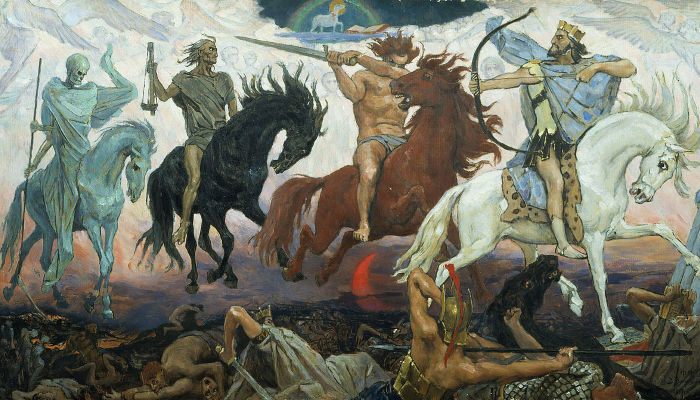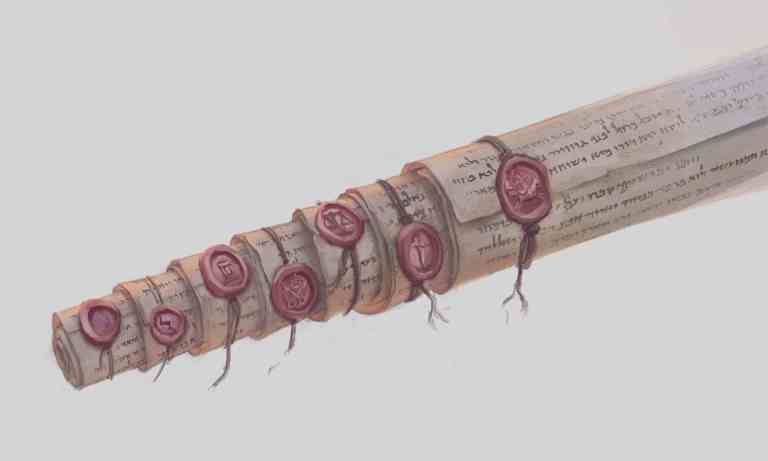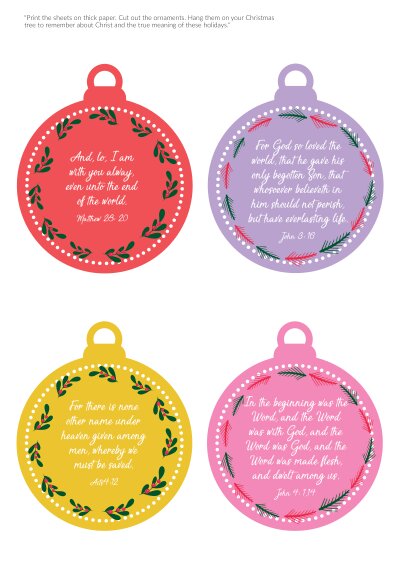“Glory, and Power, Be unto … the Lamb for Ever”

“The Revelation” was received on the Lord’s day by John on the isle of Patmos (Rev. 1:9–10), off the coast of Asia, not far from Ephesus. The exact date is not known. The Book of Mormon confirms that the recipient was John, one of the Twelve (1 Ne. 14:18–27; see D&C 20:35; 77) (Bible Dictionary).
The Book of Revelation is often called the Apocalypse, and that has caused many people today to misuse the word. Apocalypse doesn’t mean “the end of the world.” It means “revealed or uncovered.” So, it’s another word for revelation.
The first part of the Book of Revelation is a message to the 7 congregations of the church around Asia. As the book progresses it begins to deal with the events leading up to the Second Coming of Christ. Because of its vivid imagery and mysterious symbols, the Book of Revelation has a reputation for being difficult to understand. But Joseph Smith said that Revelation was “one of the plainest books God ever caused to be written” (HC 5:342).
Most people find the latter half of the book to be a bit frightening. But God has said that if we are faithful, we won’t fear.
Hints for reading and studying the Book of Revelation:
Revelation is difficult reading and can be unsettling, yet it talks about the coming triumph of Christ over evil and the deliverance of those who believe in Him. Here are some ways to read and study that will help you learn a lot and keep calm.
- This revelation was shown to other prophets as well as John. Read 1 Nephi 14:19 – 29.
- Just read the headings of the entire Book of Revelation. That will give you an overarching impression of the war against evil, which started before the foundation of the world.
- Read the following scriptures first—Doctrine and Covenants Sections 45, 76, 77, 88, and 101; and Ether 13.
- Use the Joseph Smith Translation as much as possible.
The time is at hand (Revelation 1):
The early saints truly felt like the Second Coming of Christ was imminent. They had good reasons:
- Jerusalem was destroyed in 70 A.D. Armies had “encompassed it about” (as Christ had prophesied) and had destroyed the temple and dispersed the Jews. The early Christians felt they were seeing “the signs of the times.” (Christian leaders in Jerusalem were warned through revelation and led the Jerusalem Christians to safety in Pella before the siege.)
- The Roman state persecution of Christians had begun under Nero in 64 A.D. when Rome burned and Nero executed Peter and Paul.
- Apostasy was tearing at the church. False teachers and doctrines abounded.
- Life was hard for the early Christians even before state-sponsored persecution got started. They were misunderstood by the pagan world around them and were hated for their beliefs and culture.
In verses 5 – 7 John encourages us by saying,
And from Jesus Christ, who is the faithful witness, and the begotten of the dead, and the prince of the kings of the earth. Unto him that loved us, and us from our sins in his own ,
And hath made us and unto God and his Father; to him be and for ever and ever. Amen.
Behold, he with clouds; and every eye shall him, and they also which pierced him: and all of the earth.
Because of modern revelation and the temple rituals, we have more knowledge regarding kingship and priesthood within God’s church.
John received a vision of Christ or an angel of Christ in the midst of seven candlesticks and with seven stars in His right hand. The heavenly visitor explained that the candlesticks were the seven churches and the stars were angels or servants to those congregations. John was commanded to write and share the revelation he was about to receive.
Inheriting the Celestial Kingdom (Revelation 2):
In His revelation to the congregation at Ephesus, Christ says He approves of their labor, their patience, and their efforts to prove the churchmen who come unto them to see if they are righteous or wicked. Christ, however, chastises them for being “fallen.” They need to repent. At least they have reviled the Nicolaitans.
The Nicolaitans came from Nicolas, deacon of the church of Jerusalem, who, along with Stephen and others, was ordained by Peter. Supposedly, he abandoned his wife because of her beauty, so that whoever wanted to might enjoy her; the practice turned into debauchery, with partners being exchanged in turn. Some very early church scholars disagreed with this. They said Nicholas practiced chastity though married, and other groups claimed his name to practice promiscuity.
Christ then addressed the congregation in Smyrna. The congregation had been beset by persecutors who pretended to be Jews but were not. Christ calls these pretenders the synagogue of Satan. Jesus tells them the Christians they will be persecuted in the future but to stay strong.
In verse 11, it says, “He that hath an ear, let him hear what the Spirit saith unto the churches; He that overcometh shall not be hurt of the second .” In other words, those who keep the faith in the face of trials will gain God’s presence in heaven.
The next message is for the congregation at Pergamos. Antipas was martyred when this congregation was persecuted, so they were really being tried. However, this congregation had members who were followers of the pagan god Ba’al and even Nicolaitans. Christ calls them to repentance and proclaims the following reward (verse 17):
He that hath an ear, let him hear what the Spirit saith unto the churches; To him that will I give to eat of the hidden , and will give him a , and in the stone a new written, which no man knoweth saving he that receiveth it.
This is another blessing of celestial glory.
Christ’s message to the congregation at Thyatira is to praise them for their “works, and charity, and , and faith, and thy patience.” However, they have allowed “Jezebel, which calleth herself a prophetess, to teach and to seduce my servants to commit fornication, and to eat things sacrificed unto idols.” Jezebel had refused to repent. Christ promises her and her partners great tribulation unless they do repent. He even says He will kill her children.
Christ concludes again by reiterating some of the promises of eternal life.
Those who overcome will be with Jesus and the Father (Revelation 3):
Christ then speaks of the saints in Sardis. He is not altogether pleased with the congregation there and warns them to remember correct doctrine and behavior. He does say that there are a few in the church whose garments are white, as they are pure and obedient. He finishes His counsel with another promise:
He that , the same shall be clothed in ; and I will not his name out of the , but I will his name before my Father, and before his angels.
Christ then gives John a message for the saints at Philadelphia. He says they have a little strength, and have kept His word, and have not denied His name. The congregation at Philadelphia also has a problem with persecutors who say they are Jews but are not. Christ says the saints will have power over them. Because the saints have been patient, He will protect them from temptation. Again, another promise:
Him that overcometh will I make a pillar in the temple of my God, and he shall go no more out: and I will write upon him the of my God, and the name of the city of my God, which is , which cometh down out of heaven from my God: and I will write upon him my new name.
Christ’s next message is for the saints at Laodicea. These saints are lukewarm—neither cold nor hot. Jesus wishes they were one or the other. He says He will spew the lukewarm out of His mouth. Those who are rich boast of their riches and don’t realize that we are all beggars. He tells them to be zealous and repent. Then the promise:
To him that will I grant to with me in my , even as I also overcame, and am set down with my Father in his throne.
John sees the celestial earth (Revelation 4):
John is caught up to heaven and sees God on His throne surrounded by 24 elders. John sees a sea of glass in crystal, representing the celestialized earth. The elders and several beasts worship and praise God.
The book with 7 seals (Revelation 5):

John weeps when a book sealed with seven seals is brought forth, because no one is worthy to open the seals. But then Christ comes forward as worthy. Rejoicing over His worthiness, the elders and beasts, and thousands of angels sing a new song. New songs are mentioned several times in the scriptures, including when Zion is established in the last days. What is the nature of these new songs? Are they just musical creations, or do they have some sort of power?
The seals are opened (Revelation 6):
When the first seal is opened, John sees a white horse. The rider has a crown and a bow and goes forth conquering. When the Lamb of God opens the second seal, John sees a red horse. The rider has a sword and the power to take peace from the earth so that people kill each other. With the opening of the third seal, John sees a rider carrying balances on a black horse. He is able to weigh coins to trade for food. The opening of the fourth seal brings forth brings Death on a pale horse. These are often called the Four Horsemen of the Apocalypse and are depicted in various moving works of art.
When the fifth seal is opened, John sees the souls of those that were for the word of God and for the testimonies they held. These are crying out for God to avenge them. They are given white robes. It seems that vengeance won’t be forthcoming until future martyrs join them.
When the sixth seal is opened, there is a great and the becomes and the moon becomes as
The hosts of the exalted (Revelation 7):
John sees four angels standing at the four corners of the earth. They protect the earth from strong winds but they have the power to destroy the earth. Then an angel arises in the east having the seal of the living God. He tells the four angels not to hurt the earth until they have sealed the servants of God in their foreheads.
Twelve thousand from each tribe of Israel are sealed. In our faith, this represents worthy missionaries who go out one last time to find those God has prepared to hear the gospel. The world is so dangerous at that point that they need this sealing to protect them. Other faiths have different ideas about the 144,000. John Calvin preached that of all those who have lived on the earth only 144,000 will be saved and the others condemned to hell. Those 144,000, according to Calvin, were chosen before the foundation of the world, and nothing in the way we live on earth can change that.
We then see the multitude of those who have overcome the world through Christ and are arrayed in white robes and praising God.
The seventh seal (Revelation 8):
When the seventh seal is opened, there is silence in heaven for half an hour. John sees the seven angels standing before God, and they are given seven trumpets. Incense is then lit. (As an aside, the incense for the ancient temple in Jerusalem had many ingredients but smelled wonderful, and the fragrance could be sensed 2 miles away from the temple.) But the vapors from this end-of-times incense are cast to the earth yielding “, and thunderings, and lightnings, and an earthquake” (verse 5).
When the first angel sounds his trump there is hail and fire and all the grass and many trees are destroyed. When the second trump sounds, it seems as though a meteor strikes the sea destroying 1/3 of sea life and 1/3 of ships. With the third trump, a star falls and destroys rivers and streams. The name of the star is Wormwood and it makes the waters poisonous and bitter. The fourth trump affects the sun, moon, and stars. Then an angel flies through heaven proclaiming woe because of the effects of the coming trumps.
Wars and plagues (Revelation 9):
With the fifth trump, John sees a star fall from heaven to the earth with the key to the “bottomless pit.” When the pit is opened, the smoke darkens the sun and creates a horde of locusts. These locusts don’t harm vegetation but only the people who are not sealed on their foreheads. The people don’t die, but they are tormented because these locusts sting like scorpions. These locusts are large and sound like war machines. Satan is their captain.
With the sixth trump, the four angels are loosed. They slay 1/3 of men. The rest of men who are not killed still do not repent.
John seals up many things pertinent to the Last Days (Revelation 10):
Another mighty angel comes and declares that there will be time no longer. John takes a little book from the angel and swallows it. It tastes sweet but makes his stomach bitter. John is called to testify before peoples, nations, tongues, and kings.
The two prophets in Jerusalem (Revelation 11):
Two prophets will protect Jerusalem during the War of Armageddon for 3 1/2 years. They will be endowed with much power, including the power to seal the heavens. When they have finished their work the beast will have power to overcome and slay them. They will lie dead in the street for 3 1/2 days and then will be resurrected.
At that moment there will be an earthquake that slays many. The temple of God is opened in heaven, and there is seen in his temple the of his testament. There are “lightnings, and voices, and thunderings, and an earthquake, and great .”
Lesson Resources:
churchofjesuschrist.org — Come Follow Me


